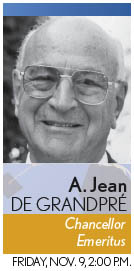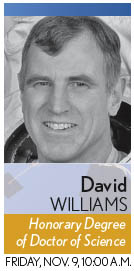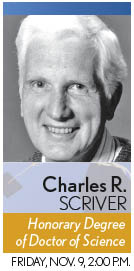
On Friday, Nov. 9, more than 1,500 students will graduate from McGill during the Fall Convocation ceremonies. As always, the newest crop of grads will enter the next phase of their lives, be it to continue their studies or begin their careers, armed with a degree recognized worldwide for excellence. And while this degree can act as a door-opener to some extent, the onus lies on each individual graduate to walk through that door and earn their spot in the world.
It is fitting that the Class of 2007, so full of hope and promise, will share the stage with a pair of Honorary Degree recipients, Dr Charles R. Scriver and Dr David Williams, and McGill's Chancellor Emeritus, A. Jean de Grandpré. Fitting because, like the grads of 2007, all three are products of McGill. All three left this school armed with a degree and desire. All three return as men who, on top of their many individual successes, have made the world a better place. All three stand as examples for graduating students and, indeed, for us all.
The Convocation ceremonies for fall 2007 will be held Friday, Nov. 9, in Place des Arts, Salle Wilfrid-Pelletier. The ceremony for students receiving graduate degrees, certificates and undergraduate degrees in Agricultural and Environmental Sciences, Arts, Centre for Continuing Education, Education, Law and Music will be held at 10:00 a.m. The afternoon session for students receiving graduate degrees, certificates and undergraduate degrees in Arts and Science (BA and BSc), Dentistry, Engineering, Management, Medicine, Religious Studies and Science will be held at 2:00 p.m. For information, go to www.mcgill.ca/convocations/fall2007.

How could A. Jean de Grandpré bolster a resumé that already includes an Order of Canada and induction into the Canadian Business Hall of Fame? By being named Chancellor Emeritus—an honour bestowed upon only one other person in McGill history, Gretta Chambers, who was named Chacellor Emerita in 2001. In 1966, de Grandpré joined Bell Canada as general counsel in what was the beginning of a long and fruitful association. Named chairman and CEO in 1976, he became the first chairman and CEO of BCE Inc. when the holding company was created in 1983. In 1984, de Grandpré became McGill's fifteenth Chancellor, a position he would hold with distinction until 1991.
In 2000, the Montreal Neurological Institute received from the A. Jean de Grandpré family generous support for an important new initiative at the Brain Tumour Research Centre. Today, the de Grandpré Communications Centre provides a high-technology communications interface for brain tumour researchers in Canada and around the world.

Few McGill grads have travelled farther from McGill once they passed through the Roddick Gates than Dr David Williams. A mission specialist on two separate space shuttle flights, Williams was aboard the Space Shuttle Endeavor in August 2007, when he set new Canadian records for completing three spacewalks, spending a total of almost 18 hours outside the shuttle.
However, even so far from home, McGill was still close to his heart. He brought with him on the mission the University coat of arms and the Woods Gold Medal he won as a medical student in 1983. From July 1998 until September 2002, Williams was Director of the Space and Life Sciences Directorate at the Johnson Space Center in Houston, Texas—making him the first non-American to hold a senior management position in NASA.
In addition to these assignments, Williams became an aquanaut in 2001, through his participation in the joint NASA-NOAA (National Oceanic and Atmospheric Administration) NEEMO 1 mission, a training exercise held in Aquarius, the world's only underwater research laboratory. During this seven-day exercise, Williams became the first Canadian to have lived and worked both in space and in the ocean.

Dr Charles R. Scriver was destined to enjoy a brilliant career in medicine—you could say it was in his genes. The son of Dr Walter Scriver of the McGill Department of Medicine, and Dr Jessie Boyd Scriver, a member of the Department of Pediatrics, Charles Scriver completed his medical training at McGill in 1955 and continued his postdoctoral work at Harvard and the University of London. From there, Scriver made many important contributions to our knowledge of inborn errors of metabolism, a large class of genetic diseases involving metabolism disorders. He was also a leader in the development and implementation of the Quebec Network of Genetic Medicine.
Thanks to Dr Scriver's work, all babies born in the province are routinely screened for a variety of genetic diseases that, if discovered early, can often be successfully treated. Granted the Distinguished Scientist Award of the Medical Research Council of Canada and the McLaughlin Medal of the Royal Society of Canada, Dr Scriver was also named a Companion of the Order of Canada, the highest rank of the Order, as well as grand officier de l'Ordre du Québec.

